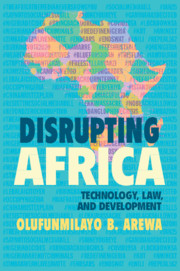Book contents
- Disrupting Africa
- Disrupting Africa
- Copyright page
- Dedication
- Contents
- Preface
- Acknowledgments
- Abbreviations and Acronyms
- Map
- 1 Introduction
- 2 Colonialism, Governance, and Law
- 3 Relationships and Accountability
- 4 Legal Imperialism and Institutions
- 5 Language, Authority, and Law
- 6 Technology Disruption and Digital Colonialism
- 7 Nigerian Princes, Start-Up Companies, and Potential Future Paths
- 8 Technology, Precarity, and Protest
- 9 Elites, Ornamentation, and Future Visions
- 10 Colonial Portfolios, Monopolies, and Competition
- 11 Conclusion
- Select Bibliography
- Index
5 - Language, Authority, and Law
Published online by Cambridge University Press: 19 July 2021
- Disrupting Africa
- Disrupting Africa
- Copyright page
- Dedication
- Contents
- Preface
- Acknowledgments
- Abbreviations and Acronyms
- Map
- 1 Introduction
- 2 Colonialism, Governance, and Law
- 3 Relationships and Accountability
- 4 Legal Imperialism and Institutions
- 5 Language, Authority, and Law
- 6 Technology Disruption and Digital Colonialism
- 7 Nigerian Princes, Start-Up Companies, and Potential Future Paths
- 8 Technology, Precarity, and Protest
- 9 Elites, Ornamentation, and Future Visions
- 10 Colonial Portfolios, Monopolies, and Competition
- 11 Conclusion
- Select Bibliography
- Index
Summary
Chapter 5 considers issues related to colonialism, language, and law. Colonial policies have had a sustained impact in the language arena. Language policies also play a critical role in law. Language choices initially made during colonialism continue to shape questions of access, justice, and fairness in legal and other contexts in African countries.
- Type
- Chapter
- Information
- Disrupting AfricaTechnology, Law, and Development, pp. 140 - 155Publisher: Cambridge University PressPrint publication year: 2021

